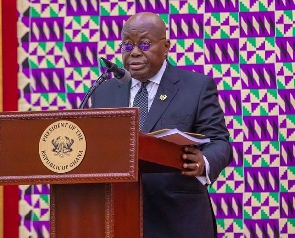 President Nana Addo Dankwa Akufo-Addo
President Nana Addo Dankwa Akufo-Addo
President Nana Addo Dankwa Akufo-Addo has called on stakeholders in education and culture to support the “Accra World Book Club 2023” initiative which takes off in Ghana’s capital, Accra beginning 24th April.
Cities designated as United Nations Educational, Scientific and Cultural Organisation (UNESCO) World Book Capital undertake activities that are aimed at encouraging the culture of reading in all ages and population groups within and outside the designated host nation’s borders.
Through the World Book Capital programme, UNESCO acknowledges the city’s commitment to promoting books and fostering reading during the 12-month period between one World Book and Copyright Day and the next.
Addressing participants at the launch of the Accra World Book Capital, 2023, in Accra Monday, President Akufo-Addo said the time has come to reignite the spirit of reading and its inherent transformative power to positively impact the Ghanaian society towards Ghana becoming a learning nation.
He said government is confident that the world book capital project will lay a strong foundation for Ghana and Africa to spare the implementation of the declarations emanating from the key continental and global education moments including activities earmarked for the 2024 Africa Union year of education.
“To achieve this, President Akufo-Addo emphasised there need for collective thinking and collaborative working among stakeholders in the education and culture spaces, and called on all stakeholders to come on board and “support the programmes for maximum impact.”
The President further called on private sectors, corporate organisations, the UN family, foundations, and similar institutions to support financially, “the exciting initiative that seeks to connect minds for socio-economic progress.”
The Director-General of UNESCO who was the special guest of honour said the comprehensive programme laid out for the yearlong celebration of the Accra World Book Capital, 2023 will leave behind a lasting legacy in Ghana.
“In choosing Accra among many other cities that were candidates, we particularly appreciated the initiatives for literature in schools, through book trusts, the initiatives to bring books everywhere including health institutions and prisons.
Also, she mentioned they were organising reading events like the marathon which is starting today, and the linking of literature with music, dance and theatre, aimed at building further the rich cultural diversity of the country.
“I am delighted that many activities will showcase the country’s linguistic diversity so that reading and writing is encouraged even more in one’s own language” she added.
UNESCO selection process
The advisory committee for the World Book Capitals project – made up of one representative of the International Authors Forum (IAF), the International Federation of Library Associations and Institutions (IFLA), the International Publishers Association (IPA) and one UNESCO representative – is in charge of examining and selecting applicant nations’ files.
A special effort is made to involve all regions of the world in turn, in conformity with the principle of geographical balance, and in line with a range of quality criteria. The nominating committee meets once every year.
The UNESCO director general is responsible for designating the cities following both internal and external consultations with the other members of the advisory committee.
The nomination does not imply any financial prize from UNESCO, but conquering the title of World Book Capital City represents an important symbolic acknowledgment, in terms of communication and promotion, and works to good effect for the winner city.
UNESCO
UNESCO seeks to build peace through international co-operation in education, the sciences and culture. Its programmes contribute to the achievement of the Sustainable Development Goals, defined in the 2030 Agenda adopted by the UN General Assembly in 2015.
As early as 1942, still during wartime, the governments of the European countries which were confronting Nazi Germany and its allies met in the United Kingdom for the Conference of Allied Ministers of Education (CAME).
World War II was far from over, yet these countries were looking for ways and means to rebuild their education systems once peace was restored. The project quickly gained momentum and soon acquired a universal character.
New governments, including that of the United States, decided to join in. Upon the proposal of CAME, a United Nations Conference for the establishment of an Educational and Cultural Organisation (ECO/CONF) was convened in London from 1 to 16 November 1945.
Scarcely had the war ended than the conference opened. It brought together representatives from 44 countries who decided to create an organisation that would embody a genuine culture of peace.
In their eyes, the new organisation would establish the “intellectual and moral solidarity of mankind” and thereby prevent the outbreak of another world war.